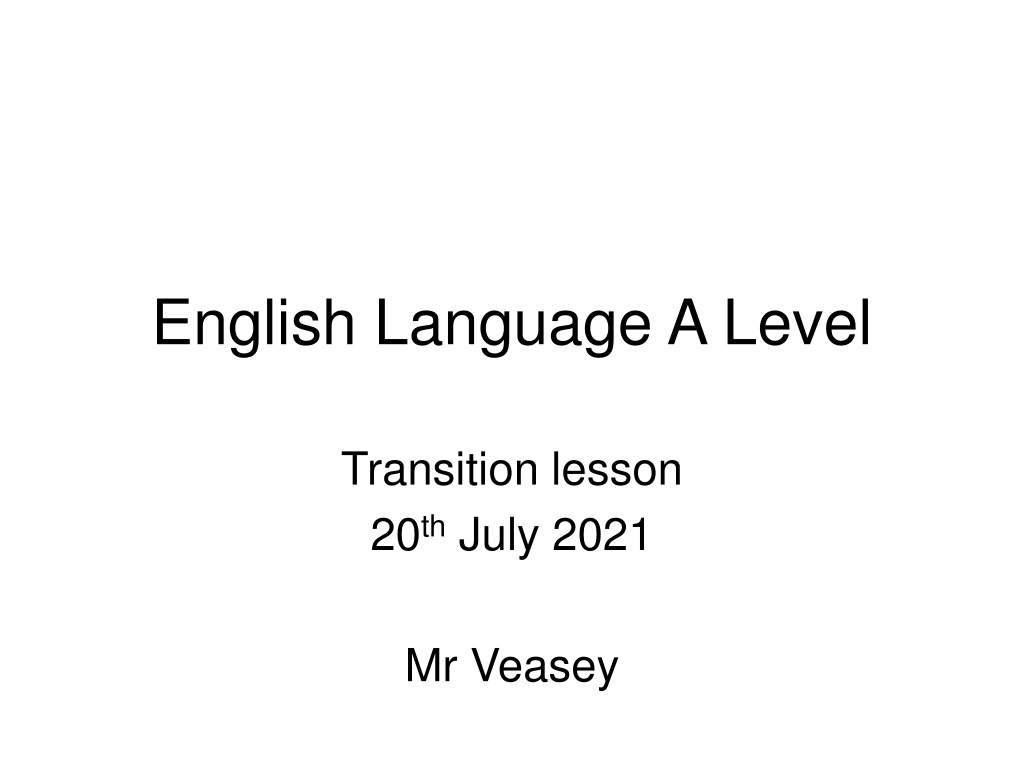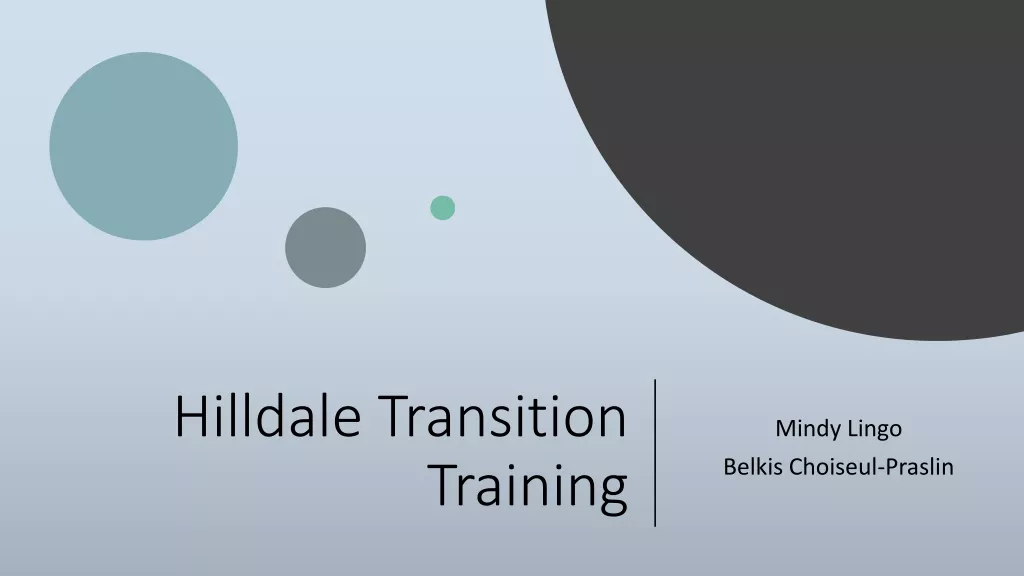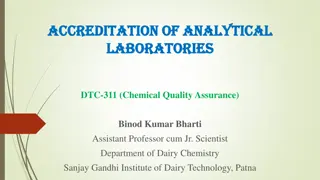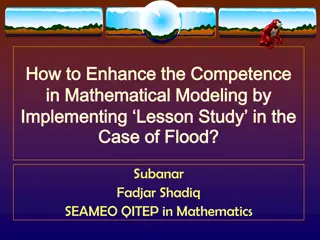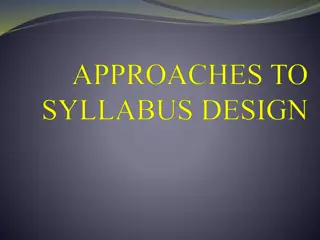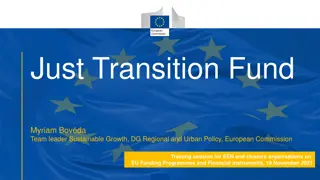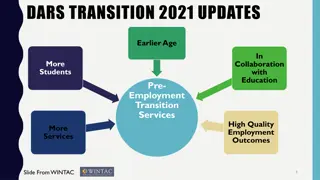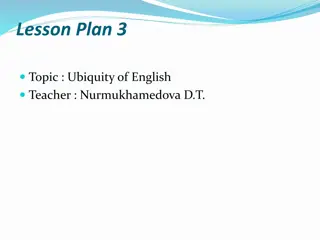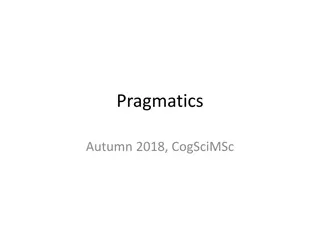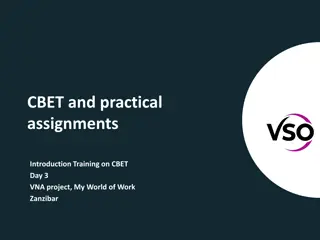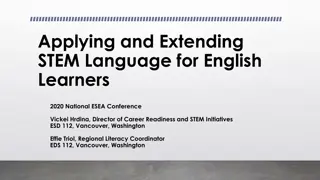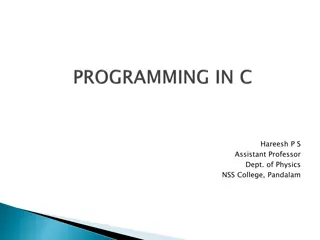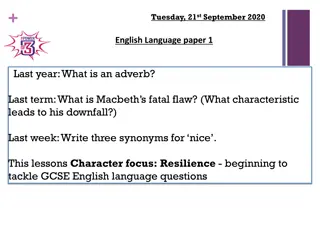Exploring Pragmatic Competence in English Language A Level Transition Lesson
In this English Language A Level Transition lesson, Mr. Veasey delves into the concept of pragmatic competence. Students are challenged to understand, apply, and explain this essential aspect of language understanding through various examples and exercises, enhancing their proficiency in language analysis and interpretation.
Download Presentation

Please find below an Image/Link to download the presentation.
The content on the website is provided AS IS for your information and personal use only. It may not be sold, licensed, or shared on other websites without obtaining consent from the author. Download presentation by click this link. If you encounter any issues during the download, it is possible that the publisher has removed the file from their server.
E N D
Presentation Transcript
English Language A Level Transition lesson 20thJuly 2021 Mr Veasey
Before we start As you are sat reading this, I have made the following assumptions: 1. 2. 3. 4. 5. 6. You like English; You enjoy reading; You enjoy writing; You possibly even enjoy reading AND writing; You are considering taking English Language as an A Level; You want a career where an English Language A Level is advantageous; You are enthusiastic; You are hard-working; You are interested in how language works, how it is used, how it varies and how it changes. 7. 8. 9.
Aims The Big Question: - Do you know what pragmatic competence is and can you apply and explain it? Learning Outcomes: - understand the term pragmatic competence; - give examples of it; - explain how it is relevant to understanding a feature of language.
MAN ON Put these two words, man on , in as many different sentences as possible Please only move on when you have at least 5 different sentences . - understand the term pragmatic competence; - give examples of it; - explain how it is relevant to understanding a feature of language.
MAN ON examples. Look, there s a man on the telly that looks like Dad! Neil Armstrong was the first man on the moon. He was angry, like a man on fire. Put that man on there and just leave it! Evil Jenkins is a man on the run. There are, obviously, many, many more you could have Tom Cruise is a man on a mission. - understand the term pragmatic competence; - give examples of it; - explain how it is relevant to understanding a feature of language.
MAN ON! - understand the term pragmatic competence; - give examples of it; - explain how it is relevant to understanding a feature of language.
What Man on could actually mean Run quickly because there s a member of the opposite team getting close! - understand the term pragmatic competence; - give examples of it; - explain how it is relevant to understanding a feature of language.
What Man on could actually mean You re going to get tackled very shortly, so pass the ball to someone else on your team. - understand the term pragmatic competence; - give examples of it; - explain how it is relevant to understanding a feature of language.
What Man on could actually mean Shoot, quickly, otherwise you will probably get tackled by the man on the other team. - understand the term pragmatic competence; - give examples of it; - explain how it is relevant to understanding a feature of language.
What Man on could actually mean Stop running and shield the ball, because if you carry on , he will just take the ball from you - understand the term pragmatic competence; - give examples of it; - explain how it is relevant to understanding a feature of language.
What Man on could actually mean MAN ON! If man on was said to you on a football pitch, you d know exactly what it meant, even though the meaning is not exactly clear. - understand the term pragmatic competence; - give examples of it; - explain how it is relevant to understanding a feature of language.
If man on was said to you on a football pitch, youd know exactly what it meant, even though the meaning is not exactly clear. This is because as skilled speakers of the English language, we have .. PRAGMATIC COMPETENCE - understand the term pragmatic competence; - give examples of it; - explain how it is relevant to understanding a feature of language.
Pragmatic competence This is the ability to understand another speaker s intended meaning. The speaker s meaning may be very different from the sentence meaning. The sentence meaning is the literal meaning of the sentence. - understand the term pragmatic competence; - give examples of it; - explain how it is relevant to understanding a feature of language.
Sentence meaning Vs. Speakers meaning 1. It is cold in here 2. I m hungry 1. Shut the door 2. Make me dinner
Sentence meaning Vs. Speakers meaning 1. It is cold in here 2. I m hungry 3. I wouldn t do that if I was you 4. Dad, I haven t got much money 5. We re going to be a bit late 1. Shut the door 2. Make me dinner
Sentence meaning Vs. Speakers meaning 1. It is cold in here 2. I m hungry 3. I wouldn t do that if I was you 4. Dad, I haven t got much money 5. We re going to be a bit late 1. Shut the door 2. Make me dinner 3. Stop that right now 4. Dad, can I have some money please? 5. Hurry up!
PRAGMATICS In linguistics (the study of language), pragmatics is concerned with bridging the explanatory gap between sentence meaning and speaker s meaning. To fully understand the speaker s meaning, context is vitally important. Pragmatics is all about the meanings between the lexis (words) and the grammar and the phonology (the way language sounds) Meanings are implied and the rules being followed are unspoken, unwritten ones. David Crystal - understand the term pragmatic competence; - give examples of it; - explain how it is relevant to understanding a feature of language.
Pragmatics TASK for each of the following sentences, explain what the speaker means. 1. I slept like a log last night. 2. Sometimes I drink my whiskey neat. 3. I couldn t put the book down. 4. I just don t know what to make of it. 5. That s a turn-up for the books. - understand the term pragmatic competence; - give examples of it; - explain how it is relevant to understanding a feature of language.
Tommy Cooper tommy_cooper - understand the term pragmatic competence; - give examples of it; - explain how it is relevant to understanding a feature of language.
Jokes I woke up in the fireplace. I slept like a log last night Other times I take my tie off and leave my shirt hanging out. Sometimes I drink my whiskey neat. I was reading this book, The History of Glue I just couldn t put it down. The other day someone gave me a piece of plasticine I didn t know what to make of it. He said, I m going to chop off the bottom of one of your trouser legs and put it in the library I thought that s a turn-up for the books. - understand the term pragmatic competence; - give examples of it; - explain how it is relevant to understanding a feature of language.
Pragmatic competence tasks 1. In your own words, explain what you understand by the term pragmatic competence . 2. Give 5 examples of a phrase where the sentence meaning is different to the speaker meaning (just like you did on slides 14-16). 3. Explain how a lack of pragmatic competence results in jokes / humour. 4. Find 5 jokes which work because of a lack of pragmatic competence (just like those ib slide 20). - Email your responses to sveasey@nationlacademy.org.uk - Please use the subject heading Transition lesson . - understand the term pragmatic competence; - give examples of it; - explain how it is relevant to understanding a feature of language.
Finally If you have any questions, about this lesson, or the course in general, then please email me at sveasey@nationalacademy.org.uk Also, please ensure the Bridging Units are completed.
